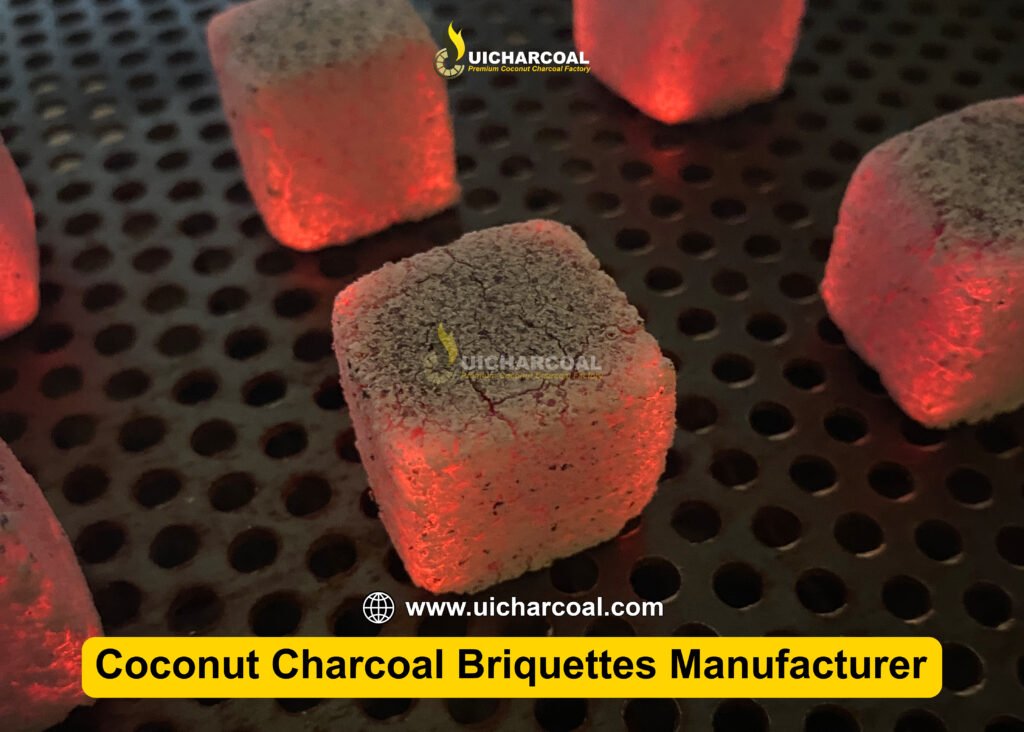In today’s world, where sustainability is no longer optional but essential, the choices we make as consumers and business owners are under more scrutiny than ever before. This is especially true in industries like food, hospitality, and tobacco where heat sources, such as charcoal, play a vital role. One product rising as a sustainable leader in both grilling and smoking applications is the eco-friendly coconut charcoal briquette.

Made from discarded coconut shells, these briquettes offer an impressive blend of performance and environmental responsibility. In this article, we’ll explore what makes coconut charcoal briquettes the future of grilling and hookah smoking, how they compare to other options, and why manufacturers like UICHARCOAL are leading the change.
What Are Coconut Charcoal Briquettes?
Coconut charcoal briquettes are a type of biomass fuel made from carbonized coconut shells. These shells, which are usually waste from the coconut industry, are processed into a fine powder, mixed with natural binders, and compressed into uniform shapes like cubes (for shisha) or hexagons (for BBQ).
Unlike wood or coal-based charcoals, coconut briquettes:
- Burn longer
- Produce less ash
- Don’t emit chemical odors or smoke
- Are made from a renewable byproduct
This makes them both performance-efficient and environmentally friendly.
Why They’re the Future of Grilling and Smoking
♻️ 1. Sustainable Raw Material
Coconut shells are agricultural waste. Instead of cutting down trees or mining coal, factories collect discarded shells from coconut oil and food industries. This upcycling process prevents waste and promotes circular economy practices.
- No deforestation
- No harm to natural ecosystems
- Abundant and renewable supply in tropical countries like Indonesia
🔥 2. Superior Burning Properties
Eco-friendliness wouldn’t matter if the performance wasn’t there. Fortunately, coconut charcoal briquettes excel in:
- Burn time: Up to 6 hours for BBQ and 90–120 minutes per cube for shisha
- Steady temperature: Perfect for grilling or vaporizing tobacco
- Low ash content: Between 1.9%–2.3%, which means less cleaning and more efficiency
These characteristics reduce the need for constant refueling and provide a cleaner cooking or smoking environment.
🚫 3. No Chemical Additives
Unlike some commercial charcoals that include accelerants, fillers, or adhesives, coconut briquettes are made using:
- 100% natural coconut shells
- Food-safe binders like tapioca starch
- Zero chemical additives or artificial scents
This makes them safer for both food preparation and inhalation during hookah use.
🌬️ 4. Odorless and Smokeless
One of the most important features — especially for hookah users — is the clean burn. Coconut charcoal briquettes don’t emit smoke or smell that could affect flavor. For chefs and shisha users, this means:
- Authentic flavor profiles
- Less eye and throat irritation
- Healthier indoor air quality
Comparison with Other Charcoal Types
Let’s break it down:
| Feature | Coconut Charcoal | Hardwood Lump | Quick Light Coal |
|---|---|---|---|
| Eco-friendly | ✅ High | ⚠️ Medium | ❌ Low |
| Long burn time | ✅ Yes | ⚠️ Varies | ❌ Short |
| Chemical-free | ✅ Yes | ✅ Usually | ❌ No |
| Odorless | ✅ Yes | ⚠️ Varies | ❌ Often has smell |
| Ash production | ✅ Low | ⚠️ Medium | ❌ High |
As seen above, coconut charcoal briquettes offer the most balanced and sustainable solution for consumers looking for quality without harming the planet.
Applications: BBQ and Hookah
For BBQ
- Even heat distribution
- Extended grilling sessions without mid-cook refills
- Clean grilling, ideal for meat, fish, and vegetables
- No aftertaste
Perfect for home chefs, restaurants, and outdoor catering businesses.
For Shisha
- Odorless, tasteless burn for pure tobacco flavor
- Less ash for smoother sessions
- Suitable for both lounge and home use
Highly favored by hookah bars and private label shisha brands across the Middle East, Europe, and the US.
The Environmental Impact
Producing charcoal from wood contributes to deforestation, while quick-light charcoals often involve harmful chemicals and pollution. In contrast, eco-friendly coconut charcoal briquettes:
- Use waste products (coconut shells)
- Reduce carbon emissions during production
- Require less energy to burn efficiently
By choosing coconut charcoal, consumers and businesses reduce their ecological footprint — a key factor for environmentally conscious buyers.
Why Indonesia Leads in Eco-Friendly Coconut Charcoal
Indonesia is the world’s leading exporter of coconut-based charcoal. The country’s natural resources, skilled labor, and established export logistics make it ideal for sustainable production.
Factories like UICHARCOAL offer:
- Advanced carbonization and shaping technology
- Consistent low-ash, odorless output
- Packaging customization for private labels
- Transparent documentation for global buyers
This reliability has made Indonesian charcoal a favorite among importers and premium brands worldwide.
Who Should Use Coconut Charcoal Briquettes?
- BBQ grill manufacturers & wholesalers seeking premium eco-fuel
- Hookah brands needing chemical-free cubes for private labeling
- Restaurants and cafes focused on sustainability and quality
- Distributors and importers catering to green-conscious consumers
Whether you’re building a product line or looking to upgrade your brand’s charcoal offering, coconut briquettes are your best bet.
Final Thoughts
Eco-conscious living isn’t just a trend — it’s a global movement. And in the world of grilling and hookah, eco-friendly coconut charcoal briquettes are leading the way. With long burn times, minimal ash, no chemicals, and responsible sourcing, they provide the performance modern users demand — without harming the planet.
As a business or end-user, switching to coconut charcoal isn’t just better for the environment — it’s better for your brand, your customers, and your conscience.
📦 Ready to go green with your charcoal supply? Contact UICHARCOAL for bulk orders, private label options, and samples of our premium coconut charcoal briquettes.
Burn responsibly. Grill clean. Smoke pure — the future is coconut.
